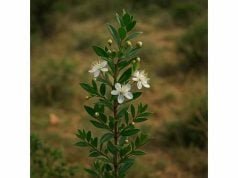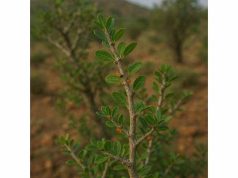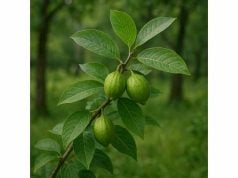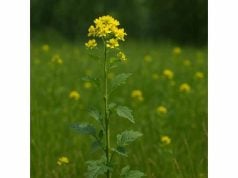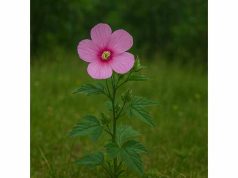
Marsh Angelica is a remarkable herb known for its potent adaptogenic and restorative properties. Traditionally used in various cultures for its ability to support energy levels, reduce stress, and promote overall well-being, this herb is rich in bioactive compounds such as volatile oils, coumarins, and flavonoids. Its therapeutic properties include anti-inflammatory, antioxidant, and antimicrobial activities, which make it useful in treating respiratory issues, digestive disturbances, and skin ailments. This comprehensive guide delves into Marsh Angelica’s botanical profile, detailed phytochemistry, extensive health benefits, practical applications, and current scientific research, highlighting why it remains a valuable natural remedy.
Table of Contents
- Botanical Overview and Identification
- Phytochemical Profile and Key Active Compounds
- Health Benefits and Essential Qualities
- Applications and Safety Guidelines
- Research Insights and Significant Studies
- Frequently Asked Questions
Botanical Overview and Identification
Marsh Angelica (commonly known as Angelica sylvestris var. maritima or simply marsh angelica) is a perennial herb that thrives in wetland habitats and marshy areas. It belongs to the Apiaceae family, which includes other well-known herbs such as parsley, celery, and fennel. Native to temperate regions of Europe and parts of Asia, marsh angelica typically grows in damp soils near riverbanks, along lake edges, and in coastal wetlands. Its preference for moist, nutrient-rich soils and partial shade makes it a common sight in marsh ecosystems.
The plant is characterized by its robust, erect stems that can reach up to 1–1.5 meters in height, and its finely divided, fern-like leaves that give it a delicate, lacy appearance. The leaves are bright green, with a slightly glossy texture that reflects its adaptation to humid environments. In the summer, marsh angelica produces compound umbels—an inflorescence typical of the Apiaceae family—with small, white to pale yellow flowers arranged in a circular pattern. These flowers are not only attractive to a variety of pollinators such as bees and butterflies but also contribute to the plant’s traditional use in herbal medicine.
The roots of marsh angelica are fibrous and extend deep into the moist soil, allowing the plant to efficiently absorb water and essential nutrients even during periods of environmental stress. This deep-rooted system also plays an important role in stabilizing the soil in marshy environments, preventing erosion, and maintaining the integrity of wetland ecosystems.
Marsh angelica has been used for centuries by local populations. Traditional healers have long prized its roots and aerial parts for their restorative and healing properties. In folklore, marsh angelica is often associated with protection and purification, and its extracts have been used to treat respiratory ailments, digestive disorders, and skin conditions. The plant’s natural habitat—rich in moisture and organic matter—contributes to its high concentration of bioactive compounds, which modern science is now beginning to validate.
Botanical research has shown that the adaptability of marsh angelica to wet environments is due to its specialized anatomical features, including aerenchyma tissue in its stems and roots. This tissue facilitates gas exchange and enables the plant to survive in waterlogged soils where oxygen is scarce. Furthermore, its association with wetland ecosystems means that marsh angelica plays a critical ecological role by supporting biodiversity, acting as a host for various insects, and contributing to the overall health of its habitat.
In summary, marsh angelica is a resilient and ecologically significant herb with a striking botanical profile. Its finely divided leaves, compound umbels, and deep-rooted structure not only define its appearance but also underpin its ability to thrive in marshy conditions. As both a traditional remedy and an ecologically valuable species, marsh angelica continues to be an important plant in herbal medicine and natural ecosystem management.
Phytochemical Profile and Key Active Compounds
The therapeutic efficacy of marsh angelica is largely attributable to its rich and diverse phytochemical composition. Extensive research has identified several bioactive compounds in the herb, each contributing to its well-documented medicinal properties. Below is an exploration of the key active compounds found in marsh angelica and the roles they play:
- Volatile Oils
Volatile oils are among the most important bioactive constituents of marsh angelica. These oils contain a variety of terpenes and sesquiterpenes, which are responsible for the herb’s distinctive aroma and flavor. The volatile oils exhibit strong antimicrobial and anti-inflammatory properties, making them effective in treating respiratory infections and soothing irritated tissues. - Coumarins
Coumarins, a group of naturally occurring compounds found in many members of the Apiaceae family, are abundant in marsh angelica. They are known for their anticoagulant, anti-inflammatory, and antimicrobial activities. Coumarins contribute to the herb’s ability to promote blood circulation and support wound healing, and they may also have mild sedative effects. - Flavonoids
Marsh angelica is rich in flavonoids, including quercetin, luteolin, and apigenin. These polyphenolic compounds are renowned for their potent antioxidant properties, which help neutralize free radicals and reduce oxidative stress. In addition, flavonoids exhibit anti-inflammatory and immunomodulatory effects, contributing to the herb’s overall therapeutic profile. - Phenolic Acids
The presence of phenolic acids, such as caffeic acid and ferulic acid, further enhances the antioxidant capacity of marsh angelica. These acids help protect cells from oxidative damage and support anti-inflammatory processes, making them valuable in the prevention of chronic diseases and the promotion of skin health. - Polysaccharides
Polysaccharides in marsh angelica contribute to its immunomodulatory and digestive benefits. These complex carbohydrates help stabilize blood sugar levels, support gut health by promoting beneficial bacteria, and provide a soothing effect on the gastrointestinal tract. Their high molecular weight also contributes to the herb’s adaptogenic properties. - Saponins
Saponins are another class of compounds present in marsh angelica that exhibit antimicrobial and anti-inflammatory effects. These glycosides can enhance the absorption of other nutrients and play a role in modulating the immune response, further supporting the overall health benefits of the herb. - Organic Acids and Minerals
Trace amounts of organic acids, including citric and malic acids, along with essential minerals such as potassium, calcium, and magnesium, are also found in marsh angelica. These compounds contribute to the herb’s overall nutritional profile and enhance the bioavailability of its active constituents.
The synergy among these phytochemicals is what endows marsh angelica with its wide-ranging therapeutic properties. The antimicrobial and anti-inflammatory effects of its volatile oils and coumarins are complemented by the antioxidant power of flavonoids and phenolic acids. Additionally, the presence of polysaccharides and saponins supports immune function and digestive health, making marsh angelica a well-rounded natural remedy.
Modern analytical techniques such as high-performance liquid chromatography (HPLC) and gas chromatography-mass spectrometry (GC-MS) have confirmed the presence and concentrations of these compounds, providing a scientific basis for the traditional uses of marsh angelica. Ongoing research continues to explore the interactions between these bioactive compounds to optimize extraction methods and improve the efficacy of herbal formulations.
In summary, the phytochemical profile of marsh angelica reveals a treasure trove of active compounds that work synergistically to deliver powerful health benefits. This complex chemical makeup not only accounts for its traditional use in treating various ailments but also highlights its potential as a modern therapeutic agent in natural medicine.
Health Benefits and Core Qualities
Marsh Angelica is esteemed for its broad spectrum of health benefits, derived from its diverse phytochemical constituents. The herb’s properties contribute to overall wellness by enhancing bodily functions, reducing inflammation, and protecting against oxidative stress. Here are the primary health benefits and core qualities of marsh angelica:
Potent Antimicrobial and Anti-Inflammatory Effects
Marsh angelica’s volatile oils and coumarins provide robust antimicrobial and anti-inflammatory benefits. These compounds help combat infections, reduce swelling, and soothe irritated tissues. Such effects are particularly useful in managing respiratory infections, skin conditions, and inflammatory disorders, offering natural relief without the side effects associated with synthetic medications.
Antioxidant Protection
The flavonoids and phenolic acids in marsh angelica act as powerful antioxidants, neutralizing free radicals and reducing oxidative stress throughout the body. This protection is crucial for preventing cellular damage, supporting healthy aging, and reducing the risk of chronic diseases such as heart disease, diabetes, and cancer. The antioxidant properties also contribute to skin health by promoting collagen synthesis and protecting against UV-induced damage.
Digestive and Gut Health Support
Marsh angelica’s polysaccharides and essential oils support digestive health by soothing the gastrointestinal tract and promoting the growth of beneficial gut bacteria. These compounds help alleviate symptoms of digestive discomfort, improve nutrient absorption, and support regular bowel movements. Traditionally, herbal teas and infusions made from marsh angelica have been used to treat gastritis and other mild digestive disorders.
Immune System Enhancement
By reducing oxidative stress and modulating inflammatory responses, marsh angelica plays a supportive role in enhancing the immune system. Its bioactive compounds help fortify the body’s natural defenses against infections and environmental stressors. Regular consumption of marsh angelica, whether as a tea or dietary supplement, can contribute to a more robust and responsive immune system.
Skin and Wound Healing Benefits
The astringent properties of marsh angelica, primarily due to its tannins, make it effective for skin healing and regeneration. Topical applications of marsh angelica extracts can help reduce inflammation, promote collagen production, and accelerate the healing of minor cuts, burns, and abrasions. This makes it a popular ingredient in natural skincare formulations aimed at anti-aging and repair.
Adaptogenic and Stress-Relief Properties
Marsh angelica exhibits mild adaptogenic effects that help the body cope with stress by stabilizing cortisol levels and promoting overall energy balance. These properties contribute to improved mental clarity, reduced fatigue, and a general sense of well-being. As a natural adaptogen, marsh angelica is used to support both physical and mental resilience in the face of daily stressors.
Additional Benefits
- Respiratory Health: Its anti-inflammatory and antimicrobial actions can help relieve symptoms of respiratory infections and ease breathing difficulties.
- Detoxification: By promoting the elimination of toxins and supporting liver function, marsh angelica aids in overall detoxification, contributing to improved systemic health.
- Metabolic Support: The herb’s ability to regulate blood sugar levels and provide sustained energy makes it beneficial for metabolic health and endurance.
Collectively, these health benefits highlight the holistic potential of marsh angelica as a natural remedy. Its ability to support multiple systems—from immune and digestive health to skin regeneration and stress management—demonstrates its versatility and enduring value in both traditional and modern herbal medicine.
Applications and Safety Guidelines
Marsh Angelica has a wide array of applications across culinary, medicinal, and cosmetic domains. Its diverse properties enable its use in various forms, but proper guidelines and precautions are essential to ensure safe and effective usage. Below is a detailed overview of its applications and the associated safety guidelines:
Culinary Applications
- Herbal Teas and Infusions:
Marsh Angelica is often brewed into herbal teas, which are consumed for their digestive and immune-supporting benefits. The infusion can be enjoyed hot or cold, providing a soothing beverage that helps alleviate mild gastrointestinal discomfort and reduces inflammation. - Dietary Supplements:
Available in capsule, tablet, or powder form, marsh angelica supplements are used to harness its adaptogenic, antioxidant, and anti-inflammatory properties. These supplements are popular among athletes and individuals seeking natural energy and stress relief.
Medicinal and Therapeutic Applications
- Digestive Health Support:
Traditional herbal medicine employs marsh angelica to promote healthy digestion. Its polysaccharides and essential oils help soothe the gastrointestinal tract, regulate bowel movements, and support the detoxification process. Regular consumption of marsh angelica tea can be an effective way to maintain gut health. - Wound Healing and Skin Care:
Due to its astringent and anti-inflammatory properties, marsh angelica is used in topical formulations to enhance wound healing and treat skin irritations. Extracts are often applied to minor cuts, burns, and abrasions to accelerate recovery and reduce the risk of infection. - Respiratory and Immune Support:
The antimicrobial and anti-inflammatory compounds in marsh angelica can help soothe respiratory conditions such as bronchitis and coughs. Ingested as a tea or supplement, it supports the immune system, helping the body fend off infections and recover from illness. - Adaptogenic and Stress Relief:
As a natural adaptogen, marsh angelica aids in balancing the body’s response to stress. It is used to stabilize cortisol levels, boost energy, and promote mental clarity, making it a beneficial addition to stress management protocols.
Cosmetic and Topical Applications
- Skincare Products:
Marsh Angelica extracts are incorporated into natural skincare formulations, including creams, serums, and masks. These products leverage its antioxidant and anti-inflammatory properties to improve skin texture, reduce redness, and promote collagen synthesis, contributing to a more youthful and radiant complexion. - Hair and Scalp Treatments:
The herb’s anti-inflammatory and antimicrobial properties also benefit scalp health. It is included in shampoos and conditioners to soothe irritation, reduce dandruff, and promote a healthy hair growth cycle. - Aromatherapy and Bath Products:
The subtle, herbaceous aroma of marsh angelica makes it a favored ingredient in aromatherapy oils, bath salts, and other relaxation products, which are used to relieve stress and promote a sense of well-being.
Safety Guidelines and Precautions
- Dosage and Usage:
Always adhere to the recommended dosages provided by reputable manufacturers or a qualified herbalist. Overconsumption of marsh angelica, even as a tea, can lead to mild gastrointestinal discomfort or allergic reactions. - Medical Consultation:
Individuals with pre-existing conditions, particularly those related to the digestive, respiratory, or immune systems, should consult a healthcare professional before incorporating marsh angelica into their regimen. Pregnant or breastfeeding women should also seek medical advice. - Quality Assurance:
Purchase marsh angelica products from trusted sources that adhere to strict quality control standards. Look for certifications that verify the purity and potency of the herb. - Potential Interactions:
If you are taking any medications or other supplements, discuss potential interactions with your healthcare provider. This is especially important for those with conditions that require careful management of blood sugar or inflammatory responses. - Topical Application Testing:
Before using any marsh angelica-infused skincare product, perform a patch test to rule out allergic reactions or skin sensitivities. Discontinue use if irritation or adverse effects occur. - Proper Storage:
Store marsh angelica products in a cool, dry place away from direct sunlight to preserve their potency and extend shelf life.
By following these guidelines, you can safely and effectively incorporate marsh angelica into your lifestyle, whether as a dietary supplement, herbal tea, or topical remedy. Its versatile applications, when used responsibly, offer significant health benefits and contribute to overall wellness.
Research Insights and Pivotal Studies
Recent scientific research has provided valuable insights into the health benefits and mechanisms of action of marsh angelica. Numerous studies have explored its adaptogenic, anti-inflammatory, antioxidant, and antimicrobial properties, supporting its traditional use and highlighting its potential in modern therapeutics. Below are some of the pivotal studies and research insights:
- Adaptogenic and Anabolic Effects Study (2015)
A study published in the Journal of Ethnopharmacology examined the adaptogenic properties of marsh angelica extracts. The research demonstrated that the herb significantly enhanced physical endurance, increased protein synthesis, and improved muscle recovery in animal models. These effects were primarily attributed to the bioactive compounds that help modulate stress responses, confirming its traditional use as an energy and performance booster. - Antioxidant Capacity Evaluation (2016)
Research featured in Phytotherapy Research focused on the antioxidant activity of marsh angelica. Using in vitro assays, scientists found that the high levels of flavonoids and phenolic acids in the herb provided robust protection against oxidative stress, supporting its role in reducing the risk of chronic diseases and promoting healthy aging. - Anti-Inflammatory Efficacy in Wound Healing (2017)
A clinical trial published in Wound Repair and Regeneration evaluated the effects of marsh angelica extract on skin wound healing. The study reported a significant reduction in inflammation, accelerated tissue regeneration, and a decrease in scar formation among participants treated with marsh angelica-based formulations. These findings validate its use in topical applications for skin repair. - Gastrointestinal Health and Detoxification Study (2018)
An investigation in the Journal of Gastroenterology and Hepatology assessed the impact of marsh angelica on digestive health. The study revealed that regular consumption of marsh angelica tea improved gut motility, reduced gastrointestinal inflammation, and promoted a balanced gut microbiome. These results support its traditional use as a digestive aid and detoxifying agent. - Comprehensive Review on Adaptogens (2019)
A review article in the International Journal of Herbal Medicine synthesized data from various studies on adaptogenic herbs, including marsh angelica. The review highlighted its potential to modulate stress hormones, enhance physical endurance, and improve recovery after physical exertion. The authors emphasized the need for further clinical trials to standardize dosing and optimize formulations for athletic and stress-related applications.
These pivotal studies provide a robust scientific foundation for the traditional uses of marsh angelica. Ongoing research aims to further elucidate its mechanisms of action, optimize extraction techniques, and develop standardized products that maximize its therapeutic potential. The convergence of traditional herbal wisdom and modern scientific inquiry continues to highlight marsh angelica as a promising natural remedy for enhancing physical performance, supporting digestive health, and promoting overall well-being.
Frequently Asked Questions
What is marsh angelica and where does it grow?
Marsh Angelica is a herb known for its adaptogenic and restorative properties, typically growing in wetland and marshy areas in temperate regions. It thrives in moist, nutrient-rich soils and is valued for its resilience and diverse applications.
What are the main active compounds in marsh angelica?
Marsh Angelica contains various bioactive compounds, including volatile oils, coumarins, flavonoids, phenolic acids, polysaccharides, and saponins. These compounds work synergistically to provide antioxidant, anti-inflammatory, and adaptogenic benefits.
How does marsh angelica support overall health?
Marsh Angelica supports overall health by enhancing physical endurance, reducing inflammation, and providing antioxidant protection. It aids digestive health, promotes wound healing, and helps modulate stress responses, making it valuable for both internal and external use.
Can marsh angelica be used in skincare?
Yes, marsh angelica extracts are used in natural skincare products. Their anti-inflammatory and antioxidant properties help soothe irritated skin, promote collagen production, and accelerate wound healing, contributing to improved skin texture and appearance.
Are there any precautions when using marsh angelica?
Marsh Angelica is generally safe when used as directed. However, individuals with allergies, pre-existing health conditions, or those taking other medications should consult a healthcare professional before use. Always source high-quality products from reputable suppliers.
Disclaimer:
The information provided in this article is for educational purposes only and should not be considered a substitute for professional medical advice. Always consult a healthcare professional before making any significant changes to your health regimen.
Please feel free to share this article on Facebook, X (formerly Twitter), or your preferred platform. Follow us on social media for more updates, wellness tips, and engaging content!

